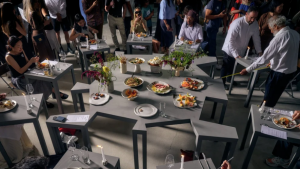ANNA and Latitudes joined forces in 2022 to create a new art award, the ANNA Award, that aims to discover, recognise and nurture a new generation of women artists in South Africa. The award, which is open to women artists of all ages regardless of their training and chosen medium, was judged by Candice Chirwa, Marianne Fassler, Makgati Molebatsi, Refiloe Mpakanyane, Jo-Ann Strauss and Nina Carew.
618 applications from across South Africa were narrowed down into a selection of 12 finalists, of which Mpumalanga-born Lerato Nkosi was awarded the top prize, and Sinalo Ngcaba was chosen as the audience favourite.
Nkosi, whose stamp and ink entries for the ANNA Award feature words inspired by her reading of bell hooks’ All About Love, gave Design Indaba some insight into her creative influences and shared words of wisdom for fellow young female artists in South Africa.
1.Congratulations on your win! What inspired you to enter the ANNA Award?
Thank you! In one of my long searches on VANSA (Visual Arts Network of South Africa), I stumbled upon the ANNA Award advertisement, and I had put it down as one of the entries I needed to focus on within that period. I found myself having to really put my wardrobe freelancing work on pause because I really wanted to enter. There was definitely a force that pushed me to pause the noise and focus on a body of work for my entry. I knew just by making it to the finalist list that my art career would be at a greater stage than it was before.
2.Which artists have influenced you, and in what way?
Lerato Motaung is one of the artists that I look into with a different set of eyes. I have been in situations of creating a piece and spending so much time with it to a point of overthinking certain details. He is one to give great advice from a different point of view. Motaung has the ability to not have a biased outlook, which is very beneficial for me when I am in the creating process.
Wangechi Mutu is another artist whose works have influenced me, especially the concepts behind her creations. Mutu’s artworks are known to be interpreted in contradictory ways, both seen as complicit in problematic society and as hopeful for future change in society. She uses imagery with intent: that it may help women to step away from perfection as it is presented in society and instead embrace their own imperfections and be accepting of the flaws of others as well.
3.Ink and stamps are your chosen medium. Why?
For me, ink and stamps are mediums that stain and certify with their contact on any surface; these materials have the ability to change the original state of an object or a surface upon contact. The stamp and ink are always used to verify and ordain documents of importance, which grants the holder automatic approval to the decision of others; this process is always handled by an individual of authority.
4.Your winning artworks were inspired by bell hooks’ All About Love – why that particular book and how did you incorporate her words into your pieces?
I was introduced to the author by my partner. I was curious to learn about how she combines personal anecdotes as well as psychological and philosophical ideas to develop and strengthen arguments in her work. Through reading the book, I delved deeper into the notion of how certain aspects of your surroundings can bring you into the individual you are in the present day.
I noted words and phrases that stood out for me during the moments of reading the book, pen and paper in hand, then I incorporated those words and phrases into stamps that I used in the works I submitted for the ANNA Award.
5.What advice would you give to fellow young female artists in South Africa?
It’s time to rise – our voices are being listened to now more than they have ever been before. The world is finally realising that we have something important to say. Don’t follow trends, stay true to yourself.
6.What are you working on at the moment, and where would you like your art to take you in the future?
I am currently working on a body of work for an international art competition. I would like for my art to live on longer than I will be able to. I would like it to potentially change
individuals’ ways of viewing themselves.
Read more:
Black Coffee, the crème de la crème.
Curating a New Future – the Louvre gets its First Female Leader in 228 Years.
Credits: Lerato Nkosi, ANNA Award






